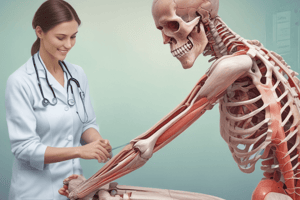Podcast
Questions and Answers
What types of medications are commonly prescribed for osteoporosis management?
What types of medications are commonly prescribed for osteoporosis management?
- Antidepressants
- Anti-resorptive and anabolic drugs (correct)
- Anti-inflammatory drugs
- Antibiotics
Which of the following medications is a common type of anti-resorptive drug used in osteoporosis treatment?
Which of the following medications is a common type of anti-resorptive drug used in osteoporosis treatment?
- NSAIDs
- Antibiotics
- Bisphosphonates (correct)
- Corticosteroids
What is a common concern associated with the use of bisphosphonates for osteoporosis treatment?
What is a common concern associated with the use of bisphosphonates for osteoporosis treatment?
- Enhanced bone formation
- Risk of atypical femoral fractures (correct)
- Reduced risk of fractures
- Decreased bone density
Which of the following genetic factors is mentioned in the text as potentially influencing treatment choices for musculoskeletal pain?
Which of the following genetic factors is mentioned in the text as potentially influencing treatment choices for musculoskeletal pain?
In managing musculoskeletal pain, why is it important to understand genetic determinants according to the text?
In managing musculoskeletal pain, why is it important to understand genetic determinants according to the text?
Which of the following conditions is NOT mentioned as a musculoskeletal disorder in the text?
Which of the following conditions is NOT mentioned as a musculoskeletal disorder in the text?
Which type of medication is commonly used for gout to lower serum uric acid levels?
Which type of medication is commonly used for gout to lower serum uric acid levels?
What is the main mechanism of action of denosumab in the context of osteoporosis treatment?
What is the main mechanism of action of denosumab in the context of osteoporosis treatment?
Which medication is NOT commonly used for gout management?
Which medication is NOT commonly used for gout management?
What is the primary purpose of denosumab in osteoporosis treatment?
What is the primary purpose of denosumab in osteoporosis treatment?
Why is it important to carefully consider the safety profiles of medications like bisphosphonates?
Why is it important to carefully consider the safety profiles of medications like bisphosphonates?
Flashcards
Musculoskeletal Disorders
Musculoskeletal Disorders
Conditions affecting muscles, bones, and joints, causing pain and disability.
Pharmacological Therapy
Pharmacological Therapy
Use of medications to manage musculoskeletal pain and prevent disease progression.
Genetic Variation in Treatment
Genetic Variation in Treatment
Differences in patients' responses to treatments due to genetic factors.
Anti-resorptive Drugs
Anti-resorptive Drugs
Signup and view all the flashcards
Osteoporosis
Osteoporosis
Signup and view all the flashcards
Gout
Gout
Signup and view all the flashcards
Xanthine Oxidase Inhibitors
Xanthine Oxidase Inhibitors
Signup and view all the flashcards
Colchicine
Colchicine
Signup and view all the flashcards
Bisphosphonates
Bisphosphonates
Signup and view all the flashcards
Challenges in Diagnosis
Challenges in Diagnosis
Signup and view all the flashcards
Molecular Mechanisms in Therapy
Molecular Mechanisms in Therapy
Signup and view all the flashcards
Study Notes
Overview of Musculoskeletal Pharmacology
Musculoskeletal disorders, ranging from osteoporosis to osteoarthritis and gout, are a leading cause of disability worldwide. These conditions can significantly impact individuals' quality of life and impose a substantial economic burden on societies. Pharmacological therapies play a critical role in managing musculoskeletal pain and preventing progression of these disorders. Understanding the underlying molecular mechanisms and implementing personalized treatment plans are essential for optimizing patient outcomes and minimizing complications.
Genetic Basis of Treatment Outcomes
Researchers are exploring the genetic factors contributing to variations in treatment responses among patients with musculoskeletal pain. One study found a genome-wide significant variant associated with switching to stronger pain relief medications, suggesting that genetic predispositions could influence treatment choices. Understanding these genetic determinants could aid in tailoring treatments to individual patients, potentially improving overall treatment effectiveness.
Osteoporosis Medications
Osteoporosis management includes both anti-resorptive and anabolic drugs. Anti-resorptive drugs, such as bisphosphonates, are commonly prescribed because of their cost-effectiveness. Nevertheless, concerns remain about the risk of atypical femoral fractures associated with these treatments. Monoclonal antibodies like denosumab, which inhibit RANK ligand activity, offer an alternative approach.
Gout Medications
Gout involves the accumulation of uric acid crystals in joints, causing intense pain. Management involves two main categories of drugs: NSAIDs to relieve inflammation and pain, and xanthine oxidase inhibitors to lower serum uric acid levels. Colchicine is another option for severe attacks. Prevention of gout relapses often requires lifelong medications.
Challenges and Future Directions
Despite advancements in pharmacological therapies, there are ongoing challenges in accurately diagnosing and stratifying patients based on disease severity and prognosis. Additionally, the safety profiles of certain medications, such as the potential side effects of bisphosphonates, must be carefully considered. Further research is necessary to better understand the molecular mechanisms behind each disease and identify additional targets for novel therapies.
Studying That Suits You
Use AI to generate personalized quizzes and flashcards to suit your learning preferences.



